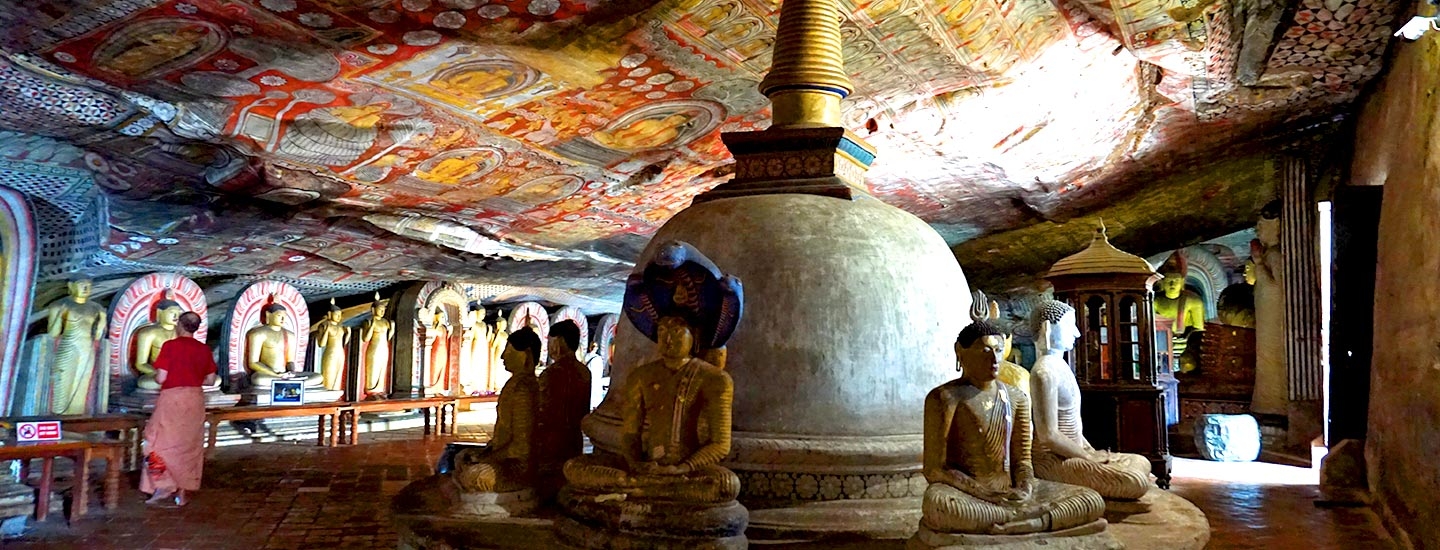Asian Regional Course on People-Nature-Culture 2019
 The Asian Regional Course on Promoting People-Centred Approaches to the Conservation of Nature and Culture (PNC19) will take place in Dambulla, Sri Lanka, on 18-30 November 2019. The venue lies close to the Golden Temple of Dambulla and the ancient city of Sigiriya, two World Heritage sites.
Organised by ICCROM (International Centre for the Study of the Preservation and Restoration of Cultural Property), IUCN (International Union for the Conservation of Nature), the Sri Lankan Department of Archaeology and the Sri Lankan Central Cultural Fund, the event is held in partnership with the Cultural Heritage Administration of Korea and the Norwegian Ministry of Climate and Environment, and in collaboration with ICOMOS and the UNESCO World Heritage Centre.
The Asian Regional Course on Promoting People-Centred Approaches to the Conservation of Nature and Culture (PNC19) will take place in Dambulla, Sri Lanka, on 18-30 November 2019. The venue lies close to the Golden Temple of Dambulla and the ancient city of Sigiriya, two World Heritage sites.
Organised by ICCROM (International Centre for the Study of the Preservation and Restoration of Cultural Property), IUCN (International Union for the Conservation of Nature), the Sri Lankan Department of Archaeology and the Sri Lankan Central Cultural Fund, the event is held in partnership with the Cultural Heritage Administration of Korea and the Norwegian Ministry of Climate and Environment, and in collaboration with ICOMOS and the UNESCO World Heritage Centre.
Themes
The People, Nature, Culture course aims at contributing towards the new paradigm shift ‘from the care of heritage to that of pursuing the wellbeing of both heritage (natural and cultural) and society as a whole’. The goal is to strengthen understanding of people and communities as a core component of heritage management among those involved in heritage management, thus ensuring that natural and cultural heritage have a dynamic and mutually beneficial role in society today and long into the future. This stems from an increasing recognition that heritage places are cared for, used and enjoyed by a vast array of people. Contributions to management, conservation and use of a heritage place come from a variety of sources, but primarily from heritage-sector practitioners, policy-makers within institutions, and representatives of communities and networks. Working with all these groups can be essential for ensuring that benefits are gained for society and for the heritage itself. Another objective is to approach natural and cultural heritage conservation as an interrelated and interdependent concept. The course aims to provide support to promote quality management at World Heritage properties and other heritage places through understanding the existing heritage management systems that were built up as separate domains. There is increasing awareness that natural attributes contribute to resilience of cultural heritage, but also that threats to natural attributes contribute to increased threats to culture, and vice versa. It is important for all relevant players to be aware of different attributes and values that build up the heritage place, and collaborate in using different approaches and methods to identify and protect diverse values holistically.Course goals
This course aims to provide participants with knowledge, skills and awareness necessary for working with diverse people and values in managing heritage places, including World Heritage, but also promote long-term networks for life-long peer learning and enhanced capacity building in the heritage sector. Moreover, the outcomes of this course, along with other World Heritage Leadership Programme initiatives, should contribute to consolidating people-centred approaches and nature-culture linkages throughout World Heritage processes. World Heritage has the potential to be a catalyst for improvements to institutional and legal frameworks in many State Parties with positive repercussions for heritage in general.Participants
The course will gather 20 participants, including:- Heritage practitioners from the cultural and natural heritage sectors, whether working in a specific heritage place or at a regional or national level.
- Individuals involved in the conservation and management of cultural and natural heritage e.g. policy-makers and other representatives of institutions, non-governmental organizations, charities, local associations, community groups, researchers etc.
- Individuals working with community groups who use heritage to bring benefits to society and/or heritage.
Conditions
Participants will be responsible for their round-trip travel costs to and from Colombo, Sri Lanka (accommodation and living costs will be provided). Candidates are strongly encouraged to seek financial support from sources such as governmental institutions, employers and funding agencies, and inform ICCROM of any funding secured or in the process of application. In cases of proven financial need, and depending on the availability of funding from external sources at the time of the course, a limited number of partial scholarships may be granted to cover travel expenses.Application and further information
Applications should be submitted to ICCROM by 30 August. For further information and registration, please visit https://www.iccrom.org/courses/asian-regional-course-people-nature-culture-2019Similar content
24 Sep 2019 - 04 Oct 2019
21 Sep 2018 - 01 Oct 2018
14 Aug 2017 - 25 Aug 2017
17 Mar 2020 - 27 Mar 2020
15 Oct 2018 - 26 Oct 2018
